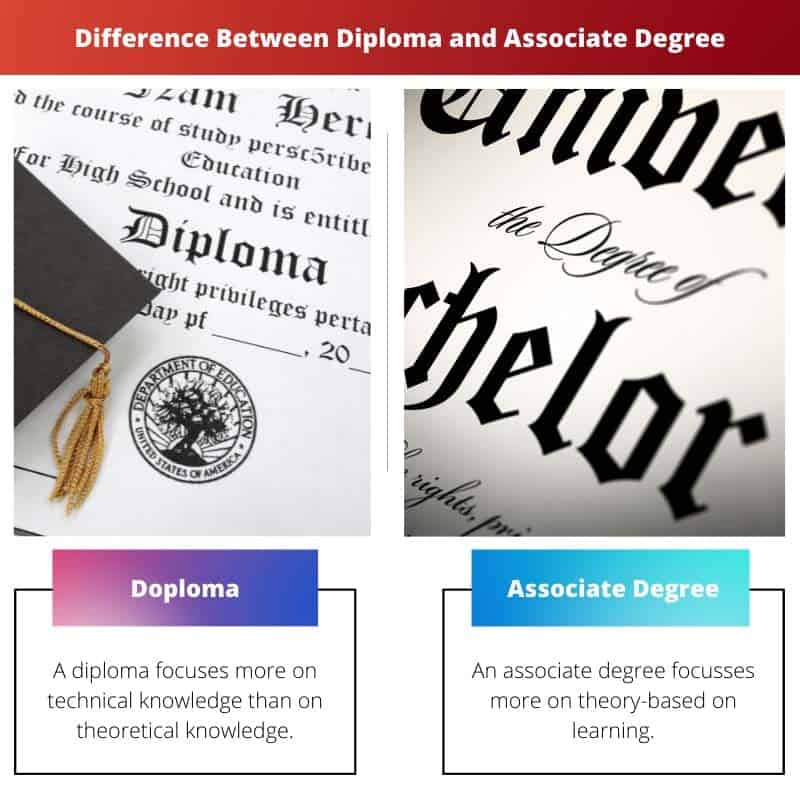In earlier times, once a student completed post-secondary education, the most common career choice was to pursue a graduate degree. The traditional way was to go to a college for a four-year degree.
With the changing times, many options have been introduced for a student. Gone are the days when building a career meant attending college for four years.
So many options are available for students to choose from after they have completed their post-secondary. These options include- a certification, diploma, or degree program.
The most suitable option depends on the job a student is looking for and the time he or she has to commit to his or her education.
Nowadays, more and more people tend to change their jobs and careers. Quite a few people realize their passion, at a later stage in life.
In such cases, too, there are various options that a person can choose from while changing career paths. Of the various options, a diploma and associate degree are the most common.
Key Takeaways
- A diploma is a certificate issued by an educational institution, such as a high school, technical school, or vocational school, that signifies the completion of a specific course of study or training program.
- An associate degree is a post-secondary degree awarded by community colleges, junior colleges, and some universities, completed in two years. It can be a terminal degree or a stepping stone toward a bachelor’s degree.
- Both diplomas and associate degrees serve as credentials for completing a course of study. Still, diplomas are issued for various educational levels and programs, while associate degrees specifically represent post-secondary education, with a broader academic scope.
Diploma vs Associate Degree
The difference between a diploma and an associate degree is that a diploma is for a shorter period and focuses on acquiring a specific skill. On the other hand, an associate degree is for a longer period and is more of general education in a specific field of study.

Comparison Table
| Parameters of Comparison | Diploma | Associate Degree |
|---|---|---|
| Focus | A diploma focuses more on technical knowledge than on theoretical knowledge. | An associate degree focuses more on theory-based learning. |
| Completion time | A diploma is for about 1 year. | An associate degree is for 2-4 years. |
| Cost | Diplomas are cost-effective programs | Associate degree programs involve a higher amount of costs. |
| Career Options | After completing a diploma, career options are limited to a specific field. | After completing an associate degree, many career options are available. |
| Class Schedule | In a diploma program, the class schedule is flexible | In an associate degree, the class schedule is a strict one. |
| Attendants | In a diploma program, most of the attendants are working professionals. | In an associate degree, most of the attendants are students. |
| Institutions offering | A diploma program is offered mostly in technical and vocational schools and community colleges. | An associate degree program is offered in 2 and 4-year colleges and universities. |
What is Diploma?
Simply put, a diploma is a certificate issued by an educational institution that confirms that the person receiving it has finished a particular course of study. The duration of a diploma course is for about a year or two.
Diplomas focus on helping the attendant acquire a specific skill in a particular field. They do not concentrate on general training. They are more technical and less theoretical.
They help acquire the required knowledge in a specific field of study. They also help by providing hands-on experience in the specific field.
This enables the attendant to learn the practice the skills rather than just reading about them in books.
A diploma is a perfect option for people who change their career paths. They can be completed quickly and are cost-effective methods of acquiring knowledge.

What is Associate Degree?
An associate degree is an educational program that colleges and universities award. The duration of an associate degree program is two years.
This program helps to train students for a particular career. It is focussed vocationally.
This program is considered to have a greater level of education than a high school diploma.
The applicants of this program are students who have completed their secondary school. This program aims to provide the applicants with some basic academic knowledge and transferable skills, which in turn help them while seeking employment or pursuing further studies.
After completing an associate degree, students can transfer to a four-year college or university to achieve a full-fledged degree.
An associate degree makes it easier for students to get a better job in the market. They stand a better chance of earning high salaries because they are prepared for positions above the entry-level.

Main Differences Between Diploma and Associate Degree
- A diploma is completed in about a year, whereas an associate degree is completed in two-four years.
- A diploma focuses more on technical and practical knowledge. On the other hand, an associate degree focuses on a theory-based form of learning.
- A diploma is a cost-effective method of acquiring knowledge, whereas an associate degree is costlier.
- After a diploma course, an attendant has limited career options. Jobs can be found in a specific field. On the other hand, after an associate degree, an attendant has various career options open.
- A diploma program is offered in technical and vocational schools, whereas an associate degree program is offered in 2 and 4-year colleges and universities.

- https://psycnet.apa.org/record/1983-21933-001
- https://journals.lww.com/nursingresearchonline/citation/1971/03000/some_characteristics_of_freshman_students_in.16.aspx

The article provides a thorough breakdown of the distinctions between a diploma and an associate degree. Well-crafted.
The article provides a detailed and informative comparison of the two educational paths. Useful for those considering their options.
An exceptional dive into the differences between diploma and associate degree programs. A must-read for those seeking insight.
This article is a great resource for students trying to grasp the distinctions between a diploma and an associate degree. Well done.
Absolutely. It’s a comprehensive overview that assists in clarifying educational pathways.
Indeed, a well-articulated and detailed comparison. A valuable read for those exploring these options.
I appreciate the in-depth analysis and clear presentation of the key differences between a diploma and an associate degree.
I agree. It’s elucidating and serves as a valuable guide for individuals weighing their educational choices.
This is a very informative piece. The article provides a great comparison of diploma and associate degree programs.
I completely agree. It’s very well-written and thorough.
Absolutely. I found it extremely helpful in understanding the key differences between the two.
Quite helpful. It’s concise and informative, making it easy to understand the nuances between a diploma and an associate degree.
Agreed, it offers a well-rounded view of the options available for post-secondary education.
Definitely an insightful read. The breakdown of the comparison is valuable for prospective students.
The article presents a clear understanding of the distinctions between a diploma and an associate degree. It’s enlightening.
I couldn’t agree more. It’s a comprehensive guide for anyone considering these educational paths.
Yes, this article does an excellent job of clarifying the differences and implications of each choice.
This article is quite enlightening. It presents a comprehensive comparison of diploma and associate degree programs.
I concur. The article serves as a valuable resource for understanding the nuances between the two options.
Absolutely. It’s an insightful guide for individuals navigating their educational paths.
I appreciate the detailed explanation and comparison of diploma and associate degree programs.